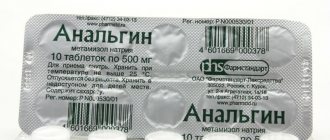Pharmacodynamics and pharmacokinetics
Magnikor tablets have all the actions due to the active components included in its composition. The main pharmacological effects of acetylsalicylic acid include inhibition of thromboxane and prostaglandin synthesis. The analgesic effect occurs due to COX inhibition. Under the influence of this component, irreversible suppression of the production of prostaglandins of classes G/H occurs. It is noted that this effect persists even after the drug is removed from the body. This happens due to the action of the main component on the synthesis of thromboxane , which is found in platelets . It is expressed by an increase in bleeding time, which normalizes with the formation of new platelets.
The antacid effect is caused by magnesium hydroxide and a factor that provides protection to the gastrointestinal mucosa from the irritating effects of aggressive acetylsalicylic acid.
Inside the body, the drug is rapidly absorbed into the mucous membranes of the gastrointestinal tract. Eating food slows down its absorption. The maximum concentration of substances in the blood is detected within 30 min-2 hours. Acetylsalicylic acid is characterized by binding to plasma proteins, which is approximately 80-90%.
Bound salicylates and a small portion of magnesium penetrate the placental and other barriers, as well as into breast milk.
Metabolism of the drug occurs in the gastric mucosa, resulting in the formation of active metabolites - salicylates . Excretion of the drug occurs mainly through the kidneys in metabolites - and a small part unchanged.
Magnicor
Name: Magnikor Pharmacological action: Magnikor is a combination drug containing acetylsalicylic acid and magnesium hydroxide.
Pharmacodynamics Acetylsalicylic acid, which is part of Magnikor, has anti-inflammatory, antipyretic, analgesic and antiplatelet effects. The main pharmacological effect of this substance is the inhibition of prostaglandin and thromboxane synthesis. The additional analgesic effect is due to COX inhibition. The anti-inflammatory effect is achieved by inhibiting the formation of PGE2 and, as a result, reducing the intensity of blood flow.
Acetylsalicylic acid causes irreversible suppression of the formation of prostaglandins of classes G/H. This effect on them continues even when the drug has already been completely eliminated from the body. This effect is due to the effect of acetylsalicylic acid on the synthesis of thromboxane found in platelets. Clinically, this effect is expressed in an increase in bleeding time. Bleeding normalizes only over time - when new platelets are formed. Magnesium hydroxide contained in the drug acts as an antacid, as well as a factor that protects the gastric and intestinal mucosa from the irritating effects of acetylsalicylic acid, which is aggressive in nature.
Pharmacokinetics After taking Magnicor, the active substances are quickly absorbed into the gastrointestinal mucosa. If the drug is taken after a meal, its absorption is reduced. There is also reduced absorption of the drug in people prone to migraines. It has been noted that the drug is absorbed better in patients suffering from achlorhydria, as well as in those taking antacids and polysorbates. The maximum concentration of Magnicor in the blood is observed approximately half an hour to two hours after administration. Magnesium is absorbed slowly and in small quantities in the small intestine. Acetylsalicylic acid binds well to plasma proteins. The binding percentage is approximately 80-90%. The weight distribution fractions in adult patients are 170 ml/kg. Bound salicylates are transported by plasma proteins throughout the body. They penetrate the placental and blood-brain barriers, and also enter breast milk during the feeding period. Magnesium is less readily bound by plasma proteins (the percentage of bound magnesium is 25-30%). Able to pass through the placental barrier.
In the body, acetylsalicylic acid is metabolized to its active metabolite, salicylate, in the gastric mucosa. After absorption, acetylsalicylic acid is quite quickly transformed into salicylic acid, but within the first 20 minutes from the moment of administration, the unchanged active substance prevails. Salicylate is metabolized to final products mainly by the liver. The average half-life is approximately 2-3 hours. With a sufficiently high dosage of Magnicor taken, the half-life increases to a day or more. Unchanged salicylate is also excreted in the urine, and the amount excreted depends on the level of acidity. If the reaction is alkaline, then up to 30% of the unchanged metabolite is excreted, if it is acidic, then only 2%. Magnesium is excreted primarily in the urine, but some is reabsorbed and removed from the body in the feces.
Indications for use: Magnicor is recommended for use in patients with chronic and acute coronary heart disease (unstable angina, acute myocardial infarction). Also, Magnicor is prescribed to prevent the recurrence of blood clots. The drug is also prescribed for the prevention of pathologies of the cardiovascular system (acute coronary syndrome). Indications for the use of Magnicor may include hypercholesterolemia, obesity, and diabetes mellitus. It is also prescribed to patients under the age of 55 who have suffered a myocardial infarction in the past.
Directions for use: Before use, in the treatment and prevention of serious diseases, it is recommended to consult with your doctor. Treatment time and dosage must be selected individually, according to your disease. It is recommended to take Magnicor tablets whole, with a drink if necessary. If desired, you can grind the tablet, chew or break it. For acute or chronic forms of coronary heart disease, an initial dosage of 150 mg per day is recommended. The maintenance dose is 75 mg per day. For angina pectoris and acute myocardial infarction, the daily dose is 150 mg - 450 mg. It is recommended to start using Magnicor at the first symptoms that appear. For the prevention of thrombosis: the daily dose is 150 mg. The maintenance dose is 75 mg per day. To prevent disorders of the cardiovascular system, it is recommended to take 75 mg of the drug per day.
Side effects: Blood and lymph: excessive bleeding often occurs due to suppression of platelet function by acetylsalicylic acid, sometimes leading to hidden bleeding. With long-term use of Magnicor, anemia was observed in some patients. Very rarely, hypoprothrombinemia, neutropenia, thrombocytopenia, agranulocytosis, eosinophilia and aplastic anemia are observed. CNS: common side effects are headache and periodic sleep disturbances. Sometimes vertigenous syndrome, ringing and noise in the ears are observed. Rare phenomena include intracranial hemorrhage, reversible hearing impairment, even deafness (at extremely high doses). From the pulmonary system: in patients with bronchial asthma, bronchospasm often occurs. Gastrointestinal system: heartburn and reflux often occur. Rarely - nausea, vomiting, dyspepsia, erosion of the upper gastrointestinal tract, diarrhea. Ulcers of the mucous membrane of the upper parts of the esophagus and tarry stools are extremely rare. Also in isolated cases, stomatitis, colitis, strictures, exacerbation of cases of irritable bowel syndrome, and ulcers of the lower digestive tract were observed.
Liver: rarely observed increased levels of transaminase and alkaline phosphatase in the blood. Extremely rare events include reversible acute hepatitis, which occurs when the recommended dosage is exceeded many times. Skin and immune system: allergic reactions often occur in the form of rash or urticaria, angioedema, hemorrhagic vasculitis, purpura. It is also possible to develop erythema multiforme, Lyell's and Stevens-Johnson syndromes. Anaphylactic reactions or manifestations of allergic rhinitis may occur. Endocrine system: side effects from this system rarely occur, manifesting themselves in the form of hypoglycemia.
Contraindications: It is strictly forbidden to take Magnicor in the following cases: - individual intolerance to the components (such as salicylic acid and its derivatives) that make up the drug; - gastric ulcer in the acute phase; - increased risk of bleeding (vitamin K deficiency, anemia, thrombocytopenia); - severe renal and liver failure; - heart failure; - history of asthma or angioedema due to use of NSAIDs or salicylates; - last trimester of pregnancy; - pediatric patients.
Pregnancy: Before using Magnicor, you should consult your doctor. If the expected positive effect of Magnicor therapy for the mother significantly exceeds the risk of threat to the fetus, then the use of the drug is possible in the period from 1 to 6 months of pregnancy. In this case, Magnicor is used only in minimal doses - up to 100 mg per day under the strict supervision of a doctor.
Interaction with other drugs: Magnicor, when taken simultaneously, potentiates the effect of anticoagulants (such as warfarin, heparin, clopidogrel, phenprocoumon) and hypoglycemic drugs. The drug suppresses the diuretic effect of furosemide, inhibits the effect of ACE and spironolactone. It is not recommended to use Magnicor simultaneously with NSAIDs. Antacids impair the absorption of this drug. Use simultaneously with probenecid reduces the effect of both drugs. No significant mutual influence of acetylsalicylic acid and magnesium was observed when using the drug. This may be due to the small amount of magnesium included in the composition.
Overdose: An overdose of Magnicor is possible with a daily dose of more than 150 mg per 1 kg of body weight. With long-term use of Magnicor in high doses (over 150 mg per 1 kg per day), moderate chronic poisoning is possible. Symptoms of such poisoning are: dizziness, deafness, tinnitus, vasodilatation, sweating, nausea, vomiting, confusion, headache. Severe acute Magnicor poisoning may cause the following symptoms: spontaneous restlessness, hyperventilation, alkaloid alkalosis, high fever, ketosis and metabolic acidosis. Among the consequences of severe Magnicor poisoning, it is necessary to note depression of the central nervous system, which can lead to coma, cardiovascular collapse and respiratory arrest. An overdose of salicylic acid and its derivatives usually causes acute liver failure (at a dosage of more than 300 mg/kg). The lethal dose for humans is more than 500 mg/kg.
In case of overdose, it is necessary to immediately rinse the stomach and allow the victim to take activated charcoal. It is also very important to restore water and electrolyte balance in order to avoid the occurrence of acidosis, dehydration, hyperpyrexia and hyperkalemia. Effective methods for removing salicylate from the circulating blood include hemodialysis, hemoperfusion, and alkaline diuresis.
Release form: Magnikor and Magnikor Forte are produced in film-coated tablets, in blisters of 10 pieces. One package contains 3 or 10 blisters.
Storage conditions: It is recommended to store Magnicor in the manufacturer's packaging at room temperature in a safe place out of reach of children.
Synonyms: Aspecard, Cardiomagnyl, Magnil.
Composition: Active ingredients: one Magnikor tablet contains 75 mg of acetylsalicylic acid, 15.2 mg of magnesium hydroxide (Magnikor Forte contains 150 mg of acetylsalicylic acid, 30.39 mg of magnesium hydroxide). Excipients: corn starch, microcrystalline cellulose, potato starch, magnesium stearate, film coating mixture.
Additionally: The use of Magnicor during long-term treatment or maintenance therapy is associated with some risks if the drug is used simultaneously with non-steroidal anti-inflammatory drugs, or is used by elderly patients: in this case, gastrointestinal bleeding may occur. It is necessary to stop taking the drug in advance (3-4 days) if surgery is planned in the near future. Patients suffering from dyspepsia, disorders of the integrity of the mucous membranes, renal and liver failure and allergic reactions to Magnicor components should also use this drug with extreme caution.
The use of salicylic acid and its derivatives, which are part of Magnicor, can lead to a decrease in the excretion of uric acid. The effect of prescribing Magnicor to children has not been studied and its effectiveness for this age group has not been proven. There are also certain risks associated with prescribing it to children. Based on this, Magnikor is strictly prohibited for use in the children's age group. Magnicor does not affect reaction speed and coordination. It is approved for use in conditions where it is necessary to work with high-precision mechanisms and control vehicles.
Attention! The description of the drug " Magnokor " on this page is a simplified and expanded version of the official instructions for use. Before purchasing or using the drug, you should consult your doctor and read the instructions approved by the manufacturer. Information about the drug is provided for informational purposes only and should not be used as a guide to self-medication. Only a doctor can decide to prescribe the drug, as well as determine the dose and methods of its use.
Indications for use
Magnicor is prescribed to patients with:
- treatment of chronic and acute forms of coronary heart disease , for example: unstable angina , acute myocardial infarction ;
- prevention of re-formation of blood clots ;
- prevention of pathologies of the cardiovascular system, for example, acute coronary syndrome ;
- hypercholesterolemia;
- obesity;
- diabetes mellitus
In addition, tablets are prescribed to patients under 55 years of age who have suffered a myocardial infarction.
Contraindications for use
Magnicor tablets are not prescribed for:
- individual intolerance to the drug;
- exacerbation of stomach ulcers ;
- increased risk of bleeding caused by vitamin K , anemia, thrombocytopenia ;
- severe renal and liver failure
- heart failure;
- asthma or Quincke's edema ;
- last trimester of pregnancy ;
- childhood.
Side effects
When treated with Magnicor, various side effects may develop related to the functioning of important organs and systems of the body. Therefore, deviations in the functioning of the nervous, respiratory, digestive, endocrine, immune and other systems are possible. Disorders affecting the condition and functions of blood and lymph cannot be excluded, for example: increased bleeding, anemia, hypoprothrombinemia, neutropenia, thrombocytopenia and others. The development of allergic reactions is often noted: urticaria, hemorrhagic vasculitis, angioedema, purpura, and so on.
Magnikor tablets, instructions for use (Method and dosage)
As the instructions for use of Magnicor indicate, the prevention and treatment of serious diseases using this drug is possible only as prescribed by a doctor. The dosage and duration of therapy is determined individually, taking into account the complexity of the disease and the characteristics of the patient’s body.
Magnikor tablets are taken whole with water. It is also possible to crush, chew or break the tablet.
Treatment of acute and chronic forms of coronary heart disease involves daily intake of 150 mg of the drug. The maintenance daily dosage is 75 mg.
When treating angina pectoris and acute myocardial infarction, a daily dose of 150-450 mg is prescribed. Start taking Magnicor immediately when the first symptoms appear.
During the prevention of blood clots, it is recommended to take 150 mg per day. Taking Magnicor 75 mg tablets provides a maintenance daily dosage. In order to prevent disorders of the cardiovascular system, it is also recommended to take 75 mg of this medicine daily.
Magnicor tablets 75 mg, 30 pcs.
Contraindications for simultaneous use.
Methotrexate. The use of acetylsalicylic acid and methotrexate in doses of 15 mg/week or more increases the hematological toxicity of methotrexate (reduction of renal clearance of methotrexate by anti-inflammatory agents and displacement of methotrexate by salicylates from binding to plasma proteins).
ACE inhibitors. ACE inhibitors in combination with high doses of acetylsalicylic acid cause a decrease in glomerular filtration due to inhibition of the vasodilatory effect of prostaglandins and a decrease in the antihypertensive effect.
Acetazolamide. It is possible that an increase in the concentration of acetazolamide may lead to the penetration of salicylates from the blood plasma into the tissue and cause acetazolamide toxicity (fatigue, lethargy, drowsiness, confusion, hyperchloremic metabolic acidosis) and salicylate toxicity (vomiting, tachycardia, hyperpnea, confusion).
Combinations for simultaneous use are not recommended.
Uricosuric agents (probenecid, sulfinpyrazone). When probenecid and high doses of salicylates (> 500 mg) are used, the metabolism of both drugs is inhibited and uric acid excretion may be reduced. Therefore, this combination of drugs should be avoided.
Combinations that should be used with caution.
Methotrexate. When using acetylsalicylic acid and methotrexate in doses less than 15 mg/week, the hematological toxicity of methotrexate increases (decreased renal clearance of methotrexate by anti-inflammatory agents and displacement of methotrexate by salicylates from binding to plasma proteins).
Clopidogrel, ticlopidine. The combined use of clopidogrel and acetylsalicylic acid has a synergistic effect. This combination use should be used with caution as it increases the risk of bleeding.
Anticoagulants (warfarin, phenprocoumon). Thrombin production may be reduced, resulting in an indirect effect on reducing platelet activity (vitamin K antagonist) and increasing the risk of bleeding.
Abciximab, tirofiban, eptifibatide. Possible inhibition of glycoprotein IIb/IIIa receptors on platelets, which leads to an increased risk of bleeding.
Heparin. There may be a decrease in thrombin production, resulting in an indirect effect on reducing platelet activity, which leads to an increased risk of bleeding.
If two or more of the above substances are used together with acetylsalicylic acid, this may lead to a synergistic effect of increased inhibition of platelet activity and, as a result, increased bleeding diathesis.
NSAIDs and COX-2 inhibitors (celecoxib). Combined use increases the risk of gastrointestinal disorders and can lead to gastrointestinal bleeding.
Ibuprofen. Concomitant use of ibuprofen inhibits irreversible platelet aggregation caused by the action of acetylsalicylic acid. Treatment with ibuprofen in patients at increased risk of cardiovascular effects may limit the cardioprotective effect of acetylsalicylic acid.
Patients using acetylsalicylic acid once daily for the prevention of cardiovascular disease and occasionally using ibuprofen should use acetylsalicylic acid at least 2 hours before using ibuprofen.
Metamizole. When used simultaneously with acetylsalicylic acid, metamizole can reduce the effect of acetylsalicylic acid on platelet aggregation. Therefore, caution is recommended when using acetylsalicylic acid (as a cardioprotector) and metamizole simultaneously.
Cyclosporine, tacrolimus. Concomitant use of NSAIDs with cyclosporine or tacrolimus may increase the nephrotoxicity of cyclosporine and tacrolimus. When using these drugs and acetylsalicylic acid simultaneously, it is necessary to monitor renal function.
Furosemide. It is possible to inhibit the proximal tubular elimination of furosemide, which leads to a decrease in the diuretic effect of furosemide.
Quinidine. Possible additive effects on platelets, resulting in increased bleeding time.
Spironolactone. A modified renin effect may occur, resulting in decreased effectiveness of spironolactone.
Selective serotonin reuptake inhibitors. Combined use increases the risk of gastrointestinal disorders and may lead to gastrointestinal bleeding.
Antiepileptic drugs (valproate, phenytoin). When used simultaneously with valproate, acetylsalicylic acid displaces it from its connection with blood plasma proteins, increasing the toxicity of the latter (suppression of the central nervous system, gastrointestinal tract).
Systemic glucocorticosteroids (excluding hydrocortisone, which is used for replacement therapy for Addison's disease) reduce the level of salicylates in the blood and increase the risk of overdose after treatment.
Antidiabetic agents. The simultaneous use of acetylsalicylic acid and antidiabetic drugs increases the risk of hypoglycemia.
Antacids. There may be an increase in renal clearance and a decrease in renal absorption (due to an increase in urine pH), which leads to a decrease in the effect of acetylsalicylic acid.
Chickenpox vaccine. Concomitant use increases the risk of developing Reye's syndrome.
Ginkgo biloba. Combined use with gingko biloba inhibits platelet aggregation, which leads to an increased risk of bleeding.
Digoxin. When used simultaneously with digoxin, the concentration of the latter in the blood plasma increases due to a decrease in renal excretion.
Barbiturates. The concentration of barbiturates in the blood serum may increase when used simultaneously with acetylsalicylic acid.
Penicillin. Prolongation of the blood half-life of penicillin.
Alcohol causes damage to the mucous membrane of the gastrointestinal tract and prolongs bleeding time due to the synergy of acetylsalicylic acid and alcohol.
Overdose
Long-term use of the drug in high dosages can cause moderate chronic poisoning. It manifests itself with symptoms such as:
- dizziness;
- deafness;
- vascular dilatation;
- noise in ears;
- heavy sweating;
- confusion;
- nausea;
- vomit.
A severe form of poisoning is accompanied by: spontaneous restlessness, hyperventilation, alkaloid alkalosis, high fever, ketosis and metabolic acidosis. The consequences of severe poisoning are: depression of the nervous system, leading to coma, cardiovascular collapse and respiratory arrest.
Also, an overdose of acetylsalicylic acid can cause acute liver failure.
In this case, they urgently perform: gastric lavage, give activated carbon .
An important point is to restore water and electrolyte balance to avoid dehydration, acidosis, hyperkalemia and hyperpyrexia . An effective method for eliminating salicylate from the blood is hemodialysis, hemoperfusion and alkaline diuresis.
MAGNIKOR tbl. 75mg N100
MAGNIKOR
COMPOSITION AND FORM OF RELEASE:
table p/captivity shell blister, No. 100
| Acetylsalicylic acid | 75 mg |
| Magnesium hydroxide | 15.2 mg |
PHARMACOLOGICAL PROPERTIES:
Pharmacodynamics. Acetylsalicylic acid is an analgesic, anti-inflammatory, antipyretic and antiplatelet agent. The main pharmacological effect is inhibition of the synthesis of prostaglandins and thromboxanes. The analgesic effect is additive and is caused by inhibition of the COX enzyme. The anti-inflammatory effect is associated with reduced blood flow, which is caused by inhibition of PGE2 synthesis. Acetylsalicylic acid irreversibly inhibits the synthesis of prostaglandins G/H, its effect on prostaglandins lasts longer than acetylsalicylic acid is in the body. The effect of acetylsalicylic acid on the biosynthesis of thromboxane in platelets and on bleeding time continues long after cessation of treatment. The effect stops only after the appearance of new platelets in the blood plasma. Magnesium hydroxide has an antacid effect and protects the mucous membrane of the digestive tract from the irritating effects of acetylsalicylic acid. Pharmacokinetics After oral administration, acetylsalicylic acid is rapidly absorbed into the gastrointestinal tract. The rate of absorption decreases after meals and in patients with migraine attacks, and increases in patients with achlorhydria or in patients taking polysorbates or antacids. Cmax in blood plasma is reached after 0.5–2 hours. When administered orally, magnesium in small quantities is slowly absorbed in the small intestine. The binding of acetylsalicylic acid to plasma proteins is 80–90%. The volume of distribution for adults is 170 ml/kg body weight. Salicylates bind to blood plasma proteins and quickly spread throughout the body. Salicylates pass into breast milk and can cross the placental barrier. Magnesium is distributed with proteins in bound form (about 25–30%). A small amount passes into breast milk. Magnesium can cross the placental barrier. Acetylsalicylic acid is hydrolyzed to the active metabolite - salicylate - in the stomach wall. After absorption, acetylsalicylic acid is quickly converted into salicylic acid, but during the first 20 minutes after oral administration it dominates in the blood plasma. Salicylate is eliminated primarily through hepatic metabolism. T½ is 2–3 hours. With a high dose of acetylsalicylic acid, T½ increases to 15–30 hours. Salicylate is also excreted unchanged in the urine. The volume excreted depends on the dose level and urine pH. About 30% of the dose is excreted in the urine if the urine reaction is alkaline, only 2% if it is acidic. A small amount of magnesium is excreted in the urine, but most is reabsorbed and excreted in the feces.
INDICATIONS:
- acute (unstable angina, acute myocardial infarction) and chronic ischemic heart disease.
- Prevention of recurrent thrombosis.
- Primary prevention of thrombosis, cardiovascular diseases, such as acute coronary syndrome in patients with factors for the development of cardiovascular diseases: hypertension, hypercholesterolemia, diabetes mellitus, obesity (body mass index
APPLICATION:
The tablets are swallowed whole, with water if necessary. If desired, the tablet can be broken in half, chewed or pre-grown. The doctor determines the course of treatment individually, depending on the indications and severity of the disease. Acute and chronic ischemic heart disease The recommended initial dose is 150 mg/day. Maintenance dose - 75 mg/day. Acute myocardial infarction. Unstable angina. The recommended dose is 150–450 mg, administered as soon as possible after the onset of symptoms. Prevention of recurrent thrombosis. The recommended starting dose is 150 mg/day. Maintenance dose – 75 mg/day. Primary prevention of thrombosis, cardiovascular diseases, such as acute coronary syndrome in patients with factors for the development of cardiovascular diseases. The recommended prophylactic dose is 75 mg/day.
CONTRAINDICATIONS:
hypersensitivity to the components of the drug, other salicylates. Stomach ulcer in the acute phase; bleeding tendency (vitamin K deficiency, thrombocytopenia, hemophilia); severe liver failure, severe renal impairment (glomerular filtration level
SIDE EFFECTS:
Adverse effects according to the frequency of occurrence are classified into the following categories: very often (>1/10); often (>1/100, 1/1000, 1/10,000, from the blood and lymphatic system: very often - increased bleeding, inhibition of platelet aggregation; sometimes - hidden bleeding; rarely - anemia (with long-term use); very rarely - hypoprothrombinemia (high doses), thrombocytopenia, neutropenia, aplastic anemia, eosinophilia, agranulocytosis. From the central nervous system: often - headache, insomnia; sometimes - dizziness (vertigo), drowsiness, ringing in the ears; rarely - intracerebral hemorrhage, dose-dependent, reversible loss hearing and deafness. From the respiratory system: often - bronchospasm (in patients with asthma). From the digestive tract: very often - heartburn, reflux; rarely - erosive lesions of the upper digestive tract, nausea, dyspepsia, vomiting, diarrhea; sometimes - ulcers upper digestive tract, including vomiting blood and tar-like bowel movements; rarely - gastrointestinal bleeding, perforation; very rarely - stomatitis, esophagitis, toxic damage with ulcers of the lower digestive tract, stricture, colitis, exacerbation of irritable bowel syndrome. From the liver: rarely - increased levels of transaminase and alkaline phosphatase in the blood serum; very rarely - dose-dependent reversible acute hepatitis of moderate severity. From the skin and immune system: often - urticaria, rashes of various types, angioedema, purpura, hemorrhagic vasculitis, erythema multiforme, Stevens-Johnson syndrome, Lyell's syndrome; sometimes - anaphylactic reactions, allergic rhinitis. From the endocrine system: rarely - hypoglycemia.
SPECIAL INSTRUCTIONS:
Long-term combined use of Magnicor with NSAIDs should be avoided, as the risk of adverse reactions increases. In elderly patients, long-term use of the drug may increase the risk of gastrointestinal bleeding. In case of planned surgery, it is recommended to stop taking the drug several days in advance. The drug should be used with caution in patients with asthma and allergic reactions, dyspepsia, known lesions of the gastric mucosa, impaired liver or kidney function. When using acetylsalicylic acid in low doses, the excretion of uric acid may be reduced. Use during pregnancy or breastfeeding. The drug can be prescribed during pregnancy (I–II trimester) and during breastfeeding only if, in the opinion of the doctor, the possible therapeutic effect for the mother outweighs the potential risk for the fetus. Use is possible only in the lowest possible doses (up to 100 mg / day) and under the close supervision of a physician. The drug is contraindicated for use in the third trimester of pregnancy. Children. Not used. The ability to influence reaction speed when driving vehicles or working with other mechanisms. The drug in therapeutic doses does not affect the reaction rate when driving vehicles or operating other mechanisms.
INTERACTIONS:
when used in combination, Magnicor enhances the effect of hypoglycemic agents, anticoagulants (for example, warfarin, phenprocoumon, clopidogrel, heparin), acetazolamide, methotrexate. Inhibits the effect of furosemide, spironolactone, and ACE inhibitors. Concomitant use with NSAIDs is not recommended. Antacids may reduce the absorption of the drug. The clinical significance of this interaction between acetylsalicylic acid and magnesium is minimal due to the small amount of magnesium that is included in the drug. Use with probenecid reduces the severity of the action of both drugs.
OVERDOSE:
dangerous dose: for adults - 150 mg/kg body weight. Symptoms of moderate chronic poisoning (the result of long-term use of the drug in high doses): dizziness, tinnitus, deafness, vasodilation, increased sweating, nausea, vomiting, headache, confusion. Symptoms of severe and acute poisoning (due to overdose): hyperventilation, high body temperature, anxiety, ketosis, alkaloid alkalosis and metabolic acidosis. In cases of severe poisoning, central nervous system depression can lead to coma, cardiovascular collapse and respiratory arrest. Acute acetylsalicylic acid poisoning (>300 mg/kg) often causes acute liver failure, and doses >500 mg/kg can be fatal. Treatment. In case of acute overdose, gastric lavage and activated charcoal intake are necessary. Fluid and electrolyte balance should be restored to avoid acidosis, hyperpyrexia, hyperkalemia, and dehydration. Effective methods for removing salicylate from blood plasma are alkaline diuresis, hemodialysis or hemoperfusion.
STORAGE CONDITIONS:
in original packaging at a temperature not exceeding 25 °C.
Interaction
The combination of Magnicor with anticoagulants - Warfarin, Heparin, Clopidogrel, Phenprocoumon and hypoglycemic drugs enhances their effect.
Concomitant use of this drug with NSAIDs is contraindicated. Combination with antacids can reduce the absorption of Magnicor, and with Probenecid it reduces the effectiveness of each drug.
Analogs
Level 4 ATC code matches:
Persantine
Aegitromb
Plavix
Coplavix
Chime
Cardiomagnyl
Polocard
Thrombo ACC
Brilinta
Plagril
Dipyridamole
Clopidogrel
Lopirel
Sylt
CardiASK
Aspirin Cardio
Acecardole
Aspinat
Aspicor
The main analogues are: Aspecard, Cardiomagnyl and Magnil.
Also have a similar effect: Paracetamol, Amizon, Cardiomagnyl, Analgin .
Reviews of Magnikor
It should be noted that reviews of Magnikor are quite common and most of them are positive.
Many patients say that during the treatment they experienced the disappearance of such unfavorable phenomena as: numbness of the hands , fatigue, shortness of breath and other ailments. Typically, improvement occurs 1-2 weeks after the start of therapy.
Of course, users report that they had to change their lifestyle: get rid of all bad habits, normalize their loads, review their diet and daily routine.
Separately, they note the low cost of this drug and good effectiveness, which is equated to some expensive drugs.
Magnicor is especially often used to prevent complications and treat patients with disorders of the cardiovascular system. You need to understand that it is not recommended to take the drug yourself in any case, since an illiterate treatment regimen can only worsen your health condition.
Magnicor during pregnancy: benefits and risks
Magnicor is a drug for the prevention of blood clots that prevents blood thickening, thereby reducing the risk of cardiovascular diseases. Pregnant women are no exception when diseases of the cardiovascular system occur, which requires taking special medications. However, Magnicor is a contraindicated drug during pregnancy, since the active ingredient of this drug is acetylsalicylic acid.
Contraindications of acetylsalicylic acid for pregnant women
First of all, acetylsalicylic acid is a non-steroidal anti-inflammatory drug, which implies inhibition of the synthesis of biologically active substances - prostaglandins, which take part in many body processes, including during pregnancy, for example, in the following:
- stimulate contractile activity of the uterus;
- take part in the advancement of the egg through the fallopian tube;
- promote exfoliation of the mucous membrane and timely cessation of bleeding (which is especially important during pregnancy).
Suppression of prostaglandin activity can negatively affect the above processes and pregnancy in general. In the first and second trimesters of pregnancy, drugs based on acetylsalicylic acid should not be prescribed without clinically justified medical indications. The dose of drugs containing acetylsalicylic acid should be as low as possible, and the duration of treatment should be shorter. During the third trimester of pregnancy, taking non-steroidal anti-inflammatory drugs that block COX-1 and COX-2 can cause the following conditions:
- premature closure of the fetal ductus arteriosus;
- oligohydramnios;
- pulmonary hypertension;
- renal dysfunction;
- fetal renal failure;
- pulmonary hypertension;
- prolongation of bleeding time.
Research
Animal studies have shown that prostaglandin synthesis inhibitors increase pre- and post-implantation loss and embryonic and fetal mortality.
Epidemiological studies suggest an increased risk of miscarriage, heart defects, and gastroschisis when used in early pregnancy. A study was conducted on the use of low-dose aspirin (60 mg per day) for the prevention and treatment of preeclampsia in 9364 pregnant women. There were no excess intraventricular bleeding, neonatal bleeding, or bleeding-related mortality observed in this study. Researchers have identified a possible role for low-dose aspirin in treating early-stage preeclampsia. Experts believe that therapy should begin between the 12th and 28th week of pregnancy and continue daily until delivery.
However, despite some positive effects of this drug, you should discuss its use with your doctor, since the risks of complications are too great.
Magnikor price, where to buy
The price of Magnikor in Russian pharmacies varies between 160-350 rubles.
You can buy Magnicor 75 mg and 150 mg in Ukraine at a price of 30-70 UAH, depending on the number of tablets in the pack and the content of the active substance.
- Online pharmacies in RussiaRussia
- Online pharmacies in UkraineUkraine
LuxPharma* special offer
- Magnicor 75 tab.
No. 100 1280 rub. order
show more
Pharmacy24
- Magnikor No. 30 tablets PAT "Kiev Vitamin Plant", Kiev, Ukraine
31 UAH. order - Magnicor forte No. 30 tablets PAT "Kiev Vitamin Plant", Kiev, Ukraine
36 UAH order
- Magnikor No. 100 tablets PAT "Kiev Vitamin Plant", Kiev, Ukraine
60 UAH.order
- Magnicor forte No. 100 tablets PAT "Kiev Vitamin Plant", Kiev, Ukraine
85 UAH order
Instructions for use MAGNECOR
Magnesium is a macroelement necessary for many energy processes and is involved in the metabolism of proteins, fats, carbohydrates and nucleic acids. Magnesium takes part in the process of neuromuscular excitation, inhibiting neuromuscular transmission. Magnesium is of particular interest as a natural physiological calcium antagonist. Magnesium controls the normal functioning of myocardial cells and is involved in the regulation of myocardial contractile function. In stressful situations, an increased amount of free ionized magnesium is excreted, and therefore the additional amount of magnesium helps to increase resistance to stress.
Magnesium deficiency leads to neuromuscular disorders (motor and sensory hyperexcitability, convulsions, paresthesia), mental changes (depression, confusion and hallucinations), cardiovascular diseases (ventricular extrasystole, tachycardia, increased sensitivity to cardiac glycosides). Magnesium deficiency during pregnancy increases the likelihood of toxicosis and premature birth.
Magnesium is one of the essential minerals needed by all living cells. Magnesium is a cofactor for about 300 enzymes, incl. associated with the transfer of phosphate groups, with all reactions requiring ATP, as well as at all stages of replication and reading of the genetic code. Magnesium is also necessary for cellular metabolism, incl. glycolysis and oxidative phosphorylation. Magnesium is important for membrane stabilization, nerve conduction, calcium channel activity, and ion transport. Depending on the severity, magnesium deficiency invariably causes secondary electrolyte imbalances (hypocalcemia, loss of intracellular potassium, and sodium and calcium oversaturation), which explains the occurrence of clinical symptoms such as impaired muscle function (neuromuscular disorders, cramps). It has been experimentally established that a lack of magnesium leads to a deficiency of potassium, while a simultaneous lack of magnesium increases the loss of potassium in cells due to a lack of potassium. Potassium replenishment is inhibited in the presence of uncorrected magnesium deficiency.
Salts of orotic acid are involved in the metabolic process. In addition, orotic acid salts are necessary for the fixation of magnesium on ATP in the cell and the manifestation of its action. Orotic acid is a key intermediate in the biosynthetic pathway of pyrimidine metabolism and, accordingly, a component of all living cells. At high metabolic demands, orotic acid is included in the pathway for the synthesis of pyrimidine nucleotides, which are necessary for RNA synthesis, and, accordingly, for RNA-dependent synthesis of proteins and phospholipids. In addition, the production of glycogen and ATP is stimulated. By synthesizing energy-rich phosphates, orotate can improve the energy status of hypoxic cells.





